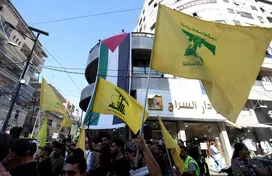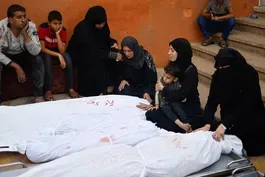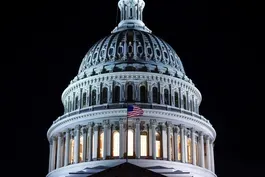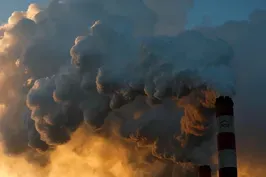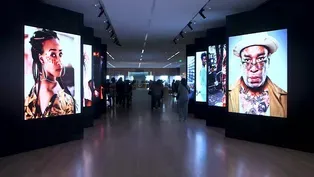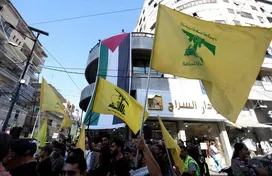
Jewish Americans share views as Israel-Hamas war continues
Clip: 11/14/2023 | 9m 3sVideo has Closed Captions
Jewish Americans share views on conflict as Israel-Hamas war continues
Tuesday in Washington, tens of thousands of people marched near the Capitol in support of Israel as its war with Hamas enters a second month. But some Jewish Americans are torn over how the Israeli government is conducting the war and the thousands of Palestinians killed in the last five weeks. William Brangham got a sampling of the different perspectives.
Problems with Closed Captions? Closed Captioning Feedback
Problems with Closed Captions? Closed Captioning Feedback
Major corporate funding for the PBS News Hour is provided by BDO, BNSF, Consumer Cellular, American Cruise Lines, and Raymond James. Funding for the PBS NewsHour Weekend is provided by...

Jewish Americans share views as Israel-Hamas war continues
Clip: 11/14/2023 | 9m 3sVideo has Closed Captions
Tuesday in Washington, tens of thousands of people marched near the Capitol in support of Israel as its war with Hamas enters a second month. But some Jewish Americans are torn over how the Israeli government is conducting the war and the thousands of Palestinians killed in the last five weeks. William Brangham got a sampling of the different perspectives.
Problems with Closed Captions? Closed Captioning Feedback
How to Watch PBS News Hour
PBS News Hour is available to stream on pbs.org and the free PBS App, available on iPhone, Apple TV, Android TV, Android smartphones, Amazon Fire TV, Amazon Fire Tablet, Roku, Samsung Smart TV, and Vizio.
Providing Support for PBS.org
Learn Moreabout PBS online sponsorshipAMNA NAWAZ: Today, in Washington, D.C., tens of thousands of people marched near the Capitol in support of Israel as its war with Hamas enters a second month.
Israeli President Isaac Herzog addressed the crowd in a live feed, and protesters were united, calling for hostages to be released and for rising antisemitism to be condemned.
But some Jewish Americans are torn over how the Israeli government is conducting the war and the number of Palestinians killed in the last five weeks.
William Brangham got a sampling of some different perspectives.
For many Jews in the U.S., this is a raw and emotionally difficult moment, one filled with great sadness and anger and anxiety.
While there's near universal condemnation of Hamas' vicious attack on October 7, Israel's response since then, its full-scale attack on Gaza, on Hamas, and the horrible death it has caused, has exposed divisions within the American Jewish population.
To get some sense of those, we spoke with a range of people with different perspectives.
Rabbi Rachel Timoner leads a reform congregation in Brooklyn, New York.
Davian Gekman is a freshman at Cornell University.
Rabbi Brant Rosen of Tzedek Chicago leads a progressive synagogue.
David P. is an orthodox Jew and lawyer in Chicago who asked we not use his last name.
Rabbi Ilana Garber advises conservative rabbis as part of the Rabbinical Assembly.
And Medea Benjamin is co-founder of the woman-led peace group known as CODEPINK.
One common theme we heard was distress that the initial empathy shown to Israel after October 7 had dissipated and that there's not more consistent coverage and focus on the hostages Hamas took.
RABBI ILANA GARBER, The Rabbinical Assembly: This was an unprovoked war between Israel and Hamas.
Hamas attacked the Jewish people on October 7.
And I feel incredibly sad, incredibly frustrated, incredibly angry.
RABBI BRANT ROSEN, Tzedek Chicago: I think what Hamas did on October 7 was a war crime, in and of itself.
And it was inexcusable.
It should be condemned.
It was horrific.
But I think Israel's response has been so disproportionate.
DAVID P., Attorney: My family has many victims of the Holocaust and my wife's family has many survivors.
And this just had eerie tropes of pogroms and the pre-Holocaust era.
And what came out afterward was even more shocking, because we felt as if antisemitism was just out there in the open.
And the same themes that came out 70 or so years ago were coming out again.
WILLIAM BRANGHAM: A more divisive issue is Israel's military response inside the Gaza Strip.
While some are calling for an immediate cease-fire, many Jewish Americans argue that Israel has every right to aggressively counterattack an enemy like Hamas.
RABBI RACHEL TIMONER, Congregation Beth Elohim: I think it is reasonable for Israel to fight to bring home the hostages.
And I think if people are calling for a cease-fire, they ought to be calling upon Hamas to return the hostages as part of what that cease-fire would look like.
And I do not hear that happening so much.
RABBI ILANA GARBER: I think a cease-fire was a great idea, and we had a cease-fire until October 7.
And so I feel like it takes two to tango, and there was a cease-fire.
WILLIAM BRANGHAM: While Israel has agreed to temporary pauses in its campaign to encourage civilians to leave certain areas, many American Jews argue, that is not enough.
They believe that the widespread destruction wrought by this counteroffensive, now estimated to have killed over 11,000 civilians, according to the Hamas-controlled Gaza Health Ministry, is immoral and unjustifiable.
Medea Benjamin is among those leading protests for a cease-fire.
MEDEA BENJAMIN, Co-Founder, CODEPINK: There should absolutely be a cease-fire.
There needs to be a cease-fire.
We can't keep watching this horrific destruction in Gaza, where so many, not only people have been destroyed, but the entire infrastructure, people's homes.
There's going to be nowhere for people to live anymore.
RABBI BRANT ROSEN: I really feel, as a member and a leader in the Jewish community, that this is a moment of deep moral reckoning right now.
And I think it's a test.
It's a test for all of us.
Over 10,000 people have been killed, and those numbers are rising.
Over 4,000 children have been killed, and those numbers are rising.
In such a circumstance, calling for a cease-fire would seem just the most moderate thing to call for.
And the fact that those of us who have been calling for a cease-fire now are considered the ones who are -- quote, unquote -- "supporting terror" and making some kind of radical suggestion, I think, to me is just mind-boggling.
DAVIAN GEKMAN, Student, Cornell University: Israel cannot consider a cease-fire.
You cannot negotiate with terrorists.
You cannot call -- you cannot have a cease-fire with Hamas still there.
I think Israel has and must eliminate Hamas, but it must protect the lives of civilians.
And I think that it needs to operate with more care at times.
DAVID P.: I'm not an expert on human rights, but I know that over 1,000 humans were killed without any provocation in one day.
And when we look at the sort of circumstance, we have to say, how was this started, and has it been remedied yet?
The answer is, it was started by one side, and it has not yet been remedied.
There are over 200 hostages who have not been returned home.
And that is an outrage.
RABBI BRANT ROSEN: I think there have been humanitarian violations on both sides.
What Hamas did on October 7 was a war crime, the killing of civilians.
What Israel is doing and what Israel has done to Gaza in the past, going in militarily and assaulting an imprisoned population, again, over two million people with nowhere to run and nowhere to hide, with tons and tons and tons of bombs, and now going in on the ground, these are war crimes as well.
WOMAN: At Cornell University, the FBI now investigating after threatening statements were posted about Jewish people on an Internet discussion board.
WILLIAM BRANGHAM: The dramatic rise in antisemitic vitriol and attacks has also been an enormous worry to many American Jews.
RABBI RACHEL TIMONER: I definitely have seen an increase in antisemitism, as I believe has every Jew in the world.
I mean, it is rampant and shocking and stunning the amount of antisemitism that is coming at Jews.
All of my members, they have seen graffiti in their neighborhoods.
We had - - our building was vandalized.
WILLIAM BRANGHAM: Davian Gekman saw this play out in recent days at Cornell.
DAVIAN GEKMAN: Here on campus, we have had a -- most recently, we had somebody on a discussion forum post that they wanted to bomb our kosher center, they wanted to kill Jews.
There was a very large discussion amongst Jews on campus whether it's safe to even be on campus.
A lot of students had -- went back home the moment that these attacks were revealed.
They did not go to class.
MEDEA BENJAMIN: I have not personally experienced antisemitism, but I have personally experienced tremendous divisions within my own family.
Some members of my family who at one time were more sympathetic to the Palestinians are now not sympathetic at all, and other members of my family who were never sympathetic to the plight of the Palestinians, and it was Israel can do no wrong.
So it's that kind of division that I have seen.
WILLIAM BRANGHAM: Some of those we spoke with still hope for a two-state solution, where peace could be achieved for both Jews and Palestinians.
But, for now, that future seems as remote as it has in decades.
RABBI ILANA GARBER: Right now, I don't know what a resolution looks like.
Every day, every hour, there's something new on the news, and I think, this is the worst it's going to be, or this is the most we will lose life or hope.
Nothing is logical anymore.
Nothing is reasonable.
I think it's going to have to be that everyone wants to work together.
That might be just an ideal dream, but if we want to live as neighbors, then we need to figure this out.
WILLIAM BRANGHAM: For the "PBS NewsHour," I'm William Brangham.
Abbas Ibrahim discusses Israel-Hamas war, Hezbollah's threat
Video has Closed Captions
Abbas Ibrahim discusses Israel-Hamas war and Hezbollah's looming threat (7m 26s)
Fighting rages around Gaza hospitals, endangering civilians
Video has Closed Captions
Civilians shoulder burden of war as fighting rages around Gaza hospitals (6m 3s)
Johnson faces major challenge as shutdown deadline looms
Video has Closed Captions
Speaker Johnson faces first major challenge as government shutdown deadline looms (7m 14s)
Latest assessment reveals cost of climate change for U.S.
Video has Closed Captions
Latest climate assessment reveals how much climate change is costing Americans (5m 12s)
Museum honors stories of enslaved Africans through genealogy
Video has Closed Captions
Museum honors untold stories of enslaved Africans through genealogy (6m 58s)
Yellen on competition and cooperation between U.S. and China
Video has Closed Captions
Treasury Secretary Yellen on economic competition and cooperation between U.S. and China (6m 29s)
Providing Support for PBS.org
Learn Moreabout PBS online sponsorshipSupport for PBS provided by:
Major corporate funding for the PBS News Hour is provided by BDO, BNSF, Consumer Cellular, American Cruise Lines, and Raymond James. Funding for the PBS NewsHour Weekend is provided by...
